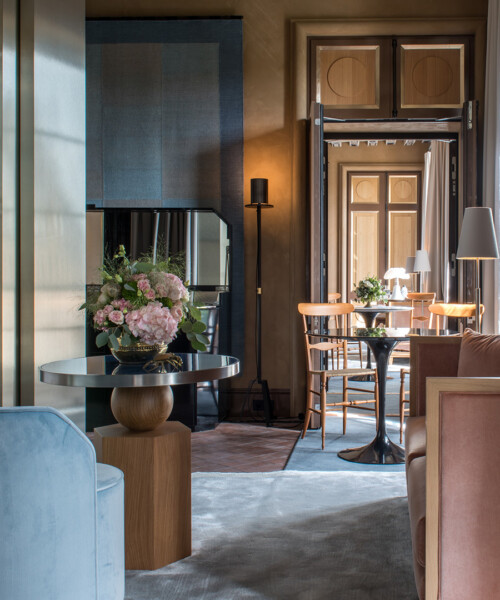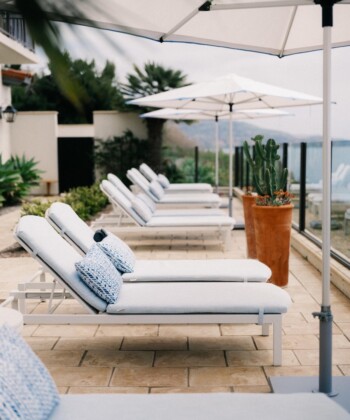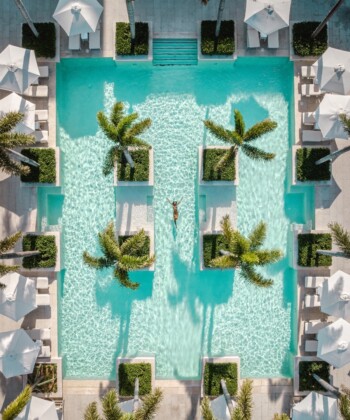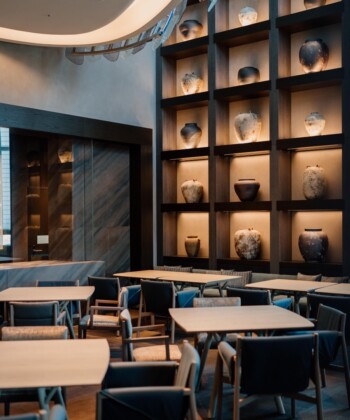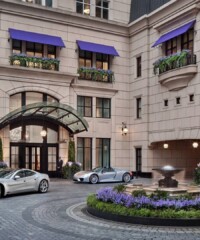Since it was founded in 2014, the Evok Hotel Collection has slowly taken over Paris with four different five-star boutique hotels, each with its own surprising identity.
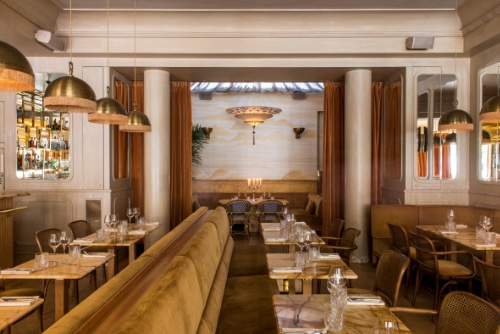
Nolinski restaurant at the Nolinski hotel
As the company’s first, the Nolinski is certainly its most classic, right in the center of it all, between Rue Saint-Honoré and the Opéra Garnier.
Philippe Starck helped transform a former 1970s mail sorting center in the 16th arrondissement into the Brach, which has both a contemporary and mid-century modern feel, along with an amazing neighborhood fitness center and a fabulous rooftop view of the Eiffel Tower.
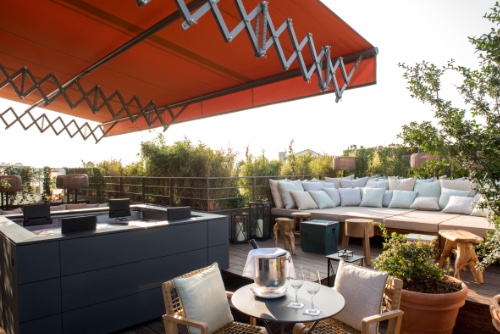
The George suite at Brach
For a slightly sexier stay, there’s the aptly named Sinner in the Marais, which playfully merges religious iconography (stained glass windows and the like) with lots of velvet mystery and opulence in what had been a former monastery and convent. Feel free to sin with regularity at the hotel’s main restaurant, which becomes an exciting fog-filled club after hours.
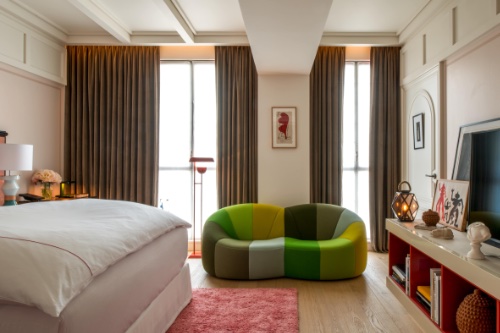
An executive guest room at Sinner
And for a completely different experience just around the corner, there’s the stunning Cour des Vosges, an intimate, 12-room, four-story time-warp with all the conveniences of modern luxury. Historical touches have been preserved along with the addition of amazing archaeological artifacts and design pieces from the 70s.
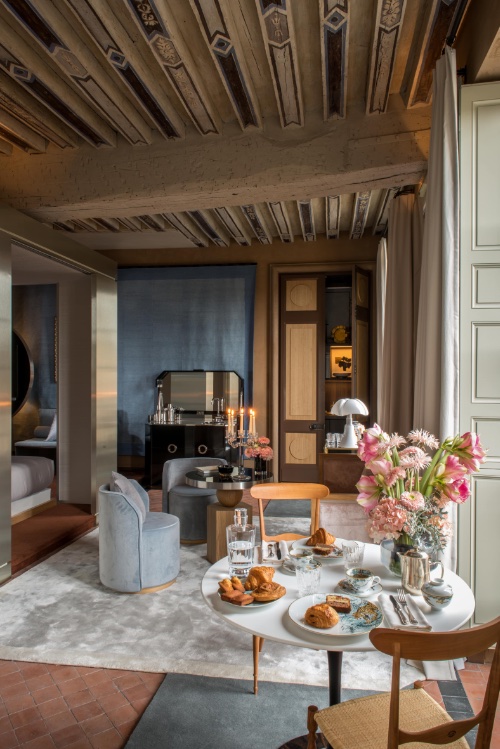
A guest room at Cour des Vosges
(For an ideal ride from New York to Paris, we suggest booking a ticket on the all-business class boutique airline La Compagnie.)
Evok is starting to expand outside of France, with a Nolinski Venice set to open in March 2023, followed by properties in Madrid and Rome.
We talked to Evok Hotels Collection co-founder and managing director Emmanuel Sauvage to learn more about how the brand started and where it’s going.
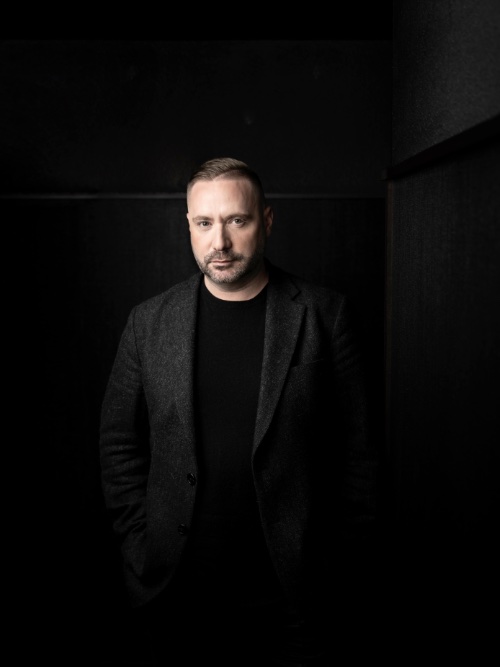
Evok Hotel Group co-founder Emmanuel Sauvage
How did Evok start?
Evok is the brainchild of Pierre Bastid, Romain Yzerman and myself. Pierre, the owner, wanted to create a group of hotels that were not in the same niche as others in the area and that had a strong heritage value. Evok was truly the product of harmoniously blending all three of our thoughts, creative energy and style. It was very important to us that every building purchased for this project was true to the DNA of the brand.
How has the brand evolved since the beginning?
We wanted to avoid giving the impression of a hotel chain. It also takes away the uniqueness of each of the locations and the individual brands [of Brach, Sinner and Nolinski.] It was impossible to have a single Evok-branded hotel because each place is unique with strong and different DNA. We decided to create a specific brand for each establishment in Paris and then develop those brands internationally. These individual identities are very important because they allow us to choose which brand we want to develop depending on the specific location. This is a much more sophisticated approach than if we had chosen to develop all our hotels under the name Evok.
Did the changing travel landscape encourage that decision?
The luxury clientele has changed a lot in recent years. It has become younger, more diverse, and now comes from different countries, including emerging countries. We have to constantly adapt to it. That’s why we have created different brands that are distinguished by their unique DNA.
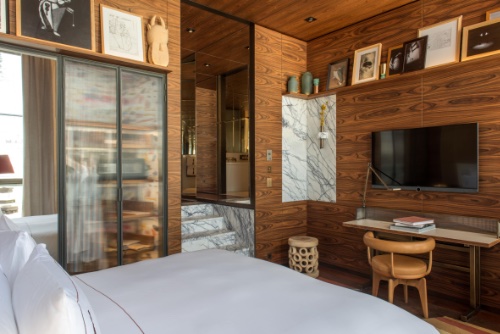
A deluxe room at Brach
How do you describe those identities?
Nolinski is a haven of tranquility located in the heart of bustling city centers. Brach brings a sophisticated, welcoming lifestyle to chic, neighborhood districts. At Sinner, the atmosphere draws on the vibrant energy of a historical neighborhood but adds an uncompromisingly edgy interpretation of culture and sophistication.
What do you think people want from hotels in Paris in 2022?
Customers are looking for a unique experience. They’re willing to spend money to have a good time because they’ve been pushed around a bit in the last couple of years. They want to be surprised. They want a human touch.
What are your thoughts about bringing Evok to the United States?
The hotels there are larger, but Evok would totally fit in Miami, New York, or Los Angeles. If we move there, we would have to ensure we maintain the DNA.
What is your favorite hotel in the world?
I don’t have a favorite hotel, but rather a collection of favorite hotels. I really like the Belmond Collection [a group of global hotels, including the Cadogan in London and Cap Juluca in Anguilla.] They have an extraordinary charm with extraordinary buildings and locations. That’s really what I like about hotels: quality and a focus on the art of living.
What is your favorite memory of staying in a hotel as a child?
I must have been 7 or 8 years old. My parents always took the Michelin Guide to go on vacation. Once, we arrived in a completely rotten hotel in Italy, one of the worst hotel experiences of my life. Eventually, my parents decided to leave the place, and we ended up in a beautiful hotel in Sanremo, a historic home with exceptional service. It was really everything I loved. It felt so good to be in that house. I still remember things perfectly: the breakfast service, the pool. Everything was there: the quality of welcome, the quality of service, the room. The whole experience was exceptional. And today, that’s exactly what the hotel industry of the 21st century needs.

























